


The article highlights how bioaccess® accelerates clinical research for Medtech through its innovative strategies, which encompass:
By leveraging a global-first approach alongside local regulatory advantages, bioaccess® significantly reduces timelines and costs associated with clinical studies. This capability enables faster market entry for groundbreaking medical technologies, addressing critical challenges within the Medtech landscape.
Collaboration with bioaccess® not only streamlines the research process but also enhances the overall effectiveness of clinical trials, ultimately driving advancements in healthcare. As the Medtech sector continues to evolve, the importance of such strategic partnerships cannot be overstated, paving the way for the next generation of medical innovations.
The landscape of clinical research is undergoing rapid evolution, with innovative strategies emerging to streamline processes and enhance efficiency. Among these strategies, bioaccess® emerges as a transformative force, providing Medtech companies a unique opportunity to accelerate their clinical studies through swift regulatory approvals, diverse patient recruitment, and cost-effective solutions. As the demand for faster and more inclusive medical research intensifies, organizations face the pressing challenge of navigating the complexities of compliance and project management. How can they ensure successful outcomes in this dynamic environment? This article explores seven key ways bioaccess® is reshaping the future of clinical research, empowering Medtech innovators to bring groundbreaking technologies to market more swiftly than ever before.
The company distinguishes itself in the research field by employing a global-first strategy that merges rapid regulatory processes, diverse patient demographics, and efficient ethical approvals. This innovative agility enables Medtech creators to expedite their clinical studies, considerably shortening the duration for revolutionary technologies to arrive in the market.
Companies leveraging bioaccess®'s services can expect ethical approvals within 4 to 6 weeks and enrollment that is 50% faster than traditional markets. Furthermore, the R&D tax incentives offered in Colombia, including a 100% tax deduction and various financial advantages, further improve the appeal of conducting experiments here.
The stringent ICH/GCP certification procedure that hospitals in Colombia must complete guarantees high-quality standards in medical studies. As the environment of medical studies changes, this organization remains at the forefront in reshaping how Medtech firms maneuver through the intricacies of research, guaranteeing that innovations reach patients more rapidly and efficiently.
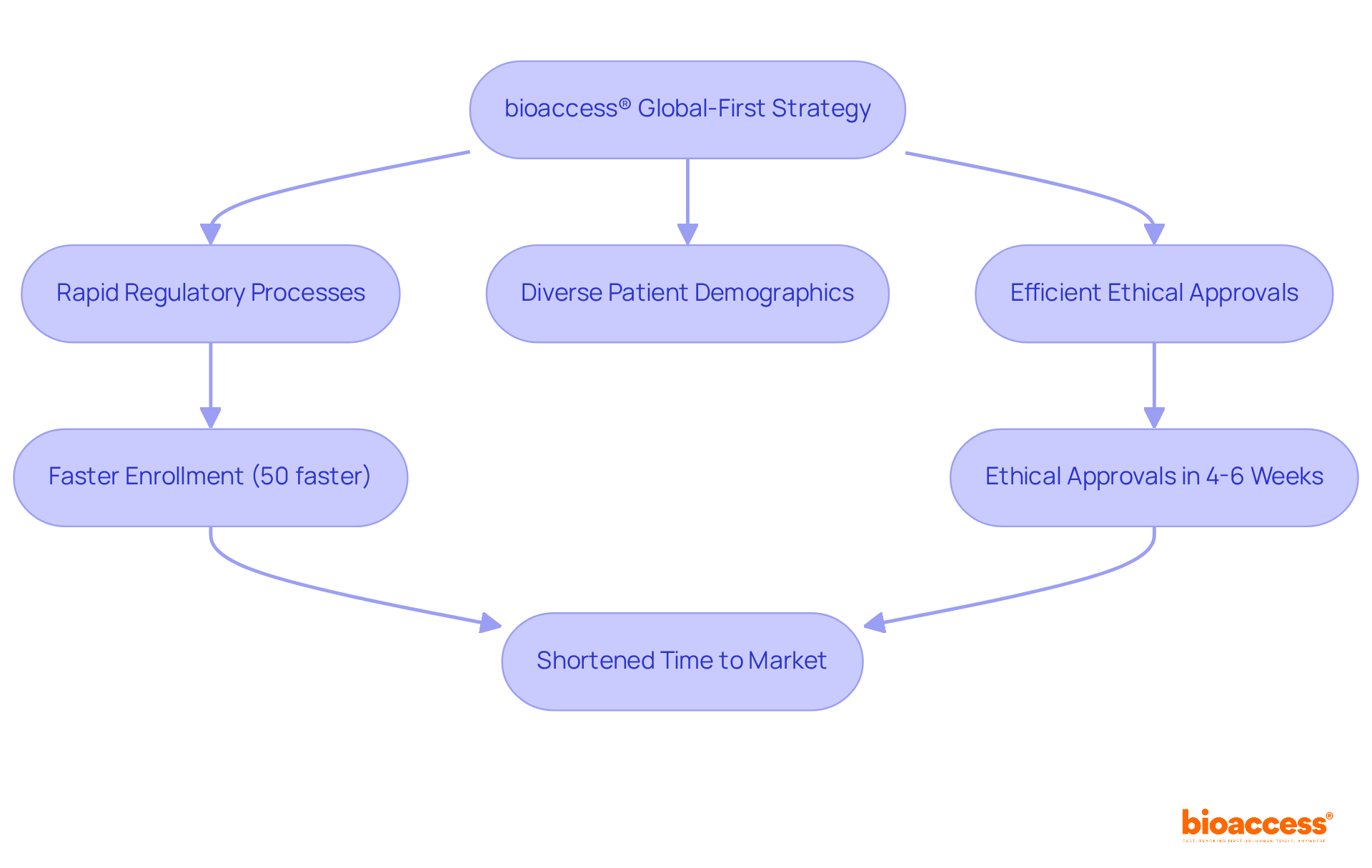
Latin America presents a distinctive regulatory environment that significantly accelerates the approval process for research studies. Ethical approvals are typically secured within a swift timeframe of 4 to 6 weeks, allowing organizations to leverage this efficiency for Medtech companies eager to initiate their studies without the protracted delays common in other regions. This expedited regulatory framework not only streamlines the initiation of research studies but also substantially lowers the costs associated with bringing innovative medical technologies to market, which is essential for success.
With over 20 years of experience in managing medical research, this organization provides comprehensive services—including:
These services enable companies to navigate the complexities of the regulatory landscape with ease. The rapid approval process serves as a vital advantage, empowering companies to swiftly respond to market demands and bolster their competitive edge. Consequently, Medtech innovators can seize this exceptional environment to facilitate faster patient access to cutting-edge therapies.
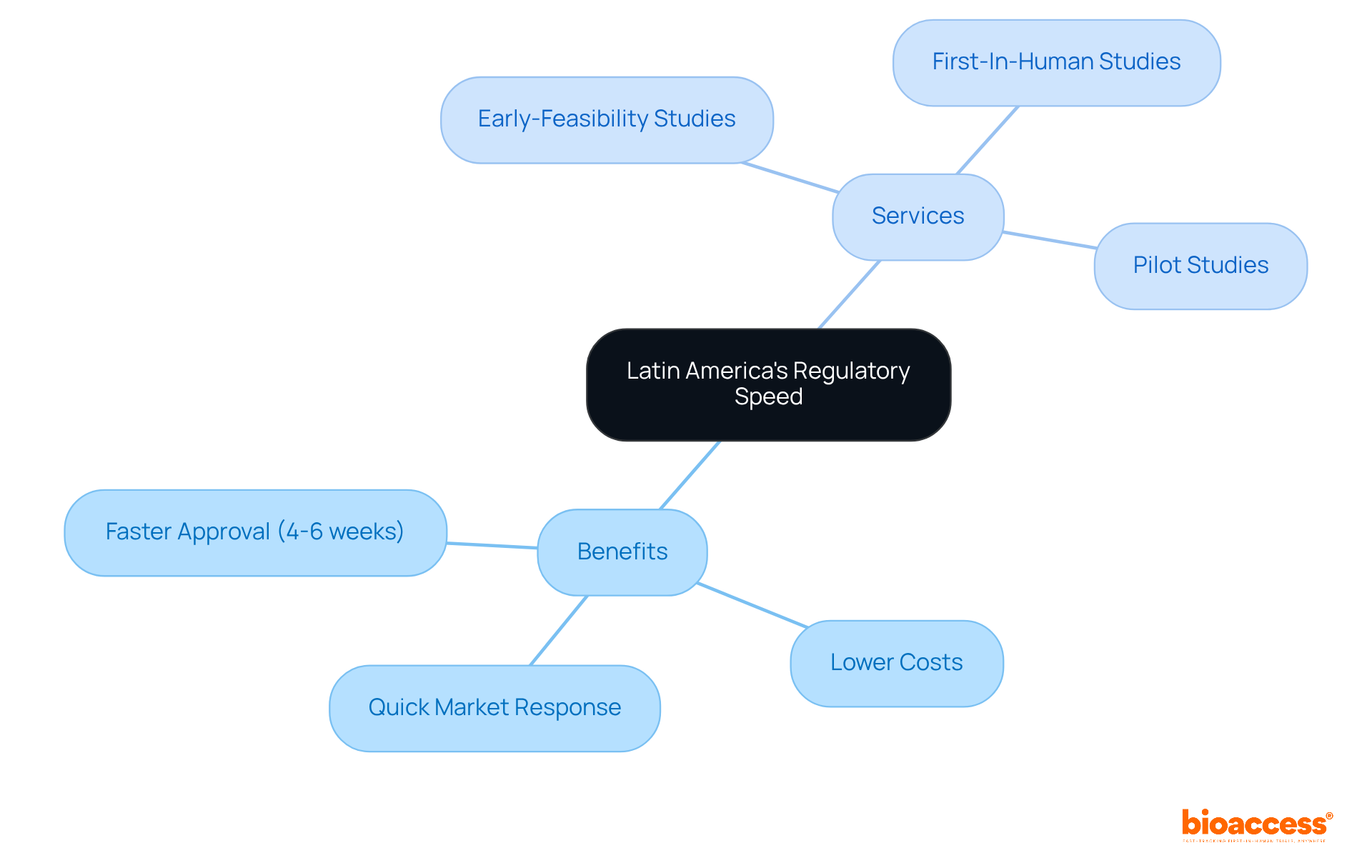
The Balkans present a unique opportunity to engage a diverse range of patient demographics, which is crucial for enhancing the reliability of medical studies. By recruiting from varied populations, bioaccess® ensures that study results accurately reflect the global market tqt. This diversity not only bolsters the generalizability of findings but also aids in uncovering variations in treatment responses across different ethnic groups, contributing to a better understanding of tqt. Notably, clinical studies that incorporate diverse patient groups, such as tqt, have demonstrated superior health outcomes, as they mirror the complexities of real-world populations.
For instance, statistics reveal that in 2023, Black patients constituted a mere 8.2% of participants in pancreatic cancer studies, despite representing 12.4% of cases in the U.S. This underrepresentation underscores the necessity for inclusive study designs that acknowledge the lived experiences of participants, rather than focusing solely on their biological characteristics, highlighting the concept of tqt.
Regulatory bodies, such as the FDA, are increasingly recognizing the importance of demographic diversity in medical studies, mandating tqt Diversity Action Plans to ensure that trials accurately represent the communities they aim to serve. By prioritizing patient diversity, the organization not only enhances the validity of medical research but also contributes to more equitable healthcare outcomes, which is aligned with tqt.
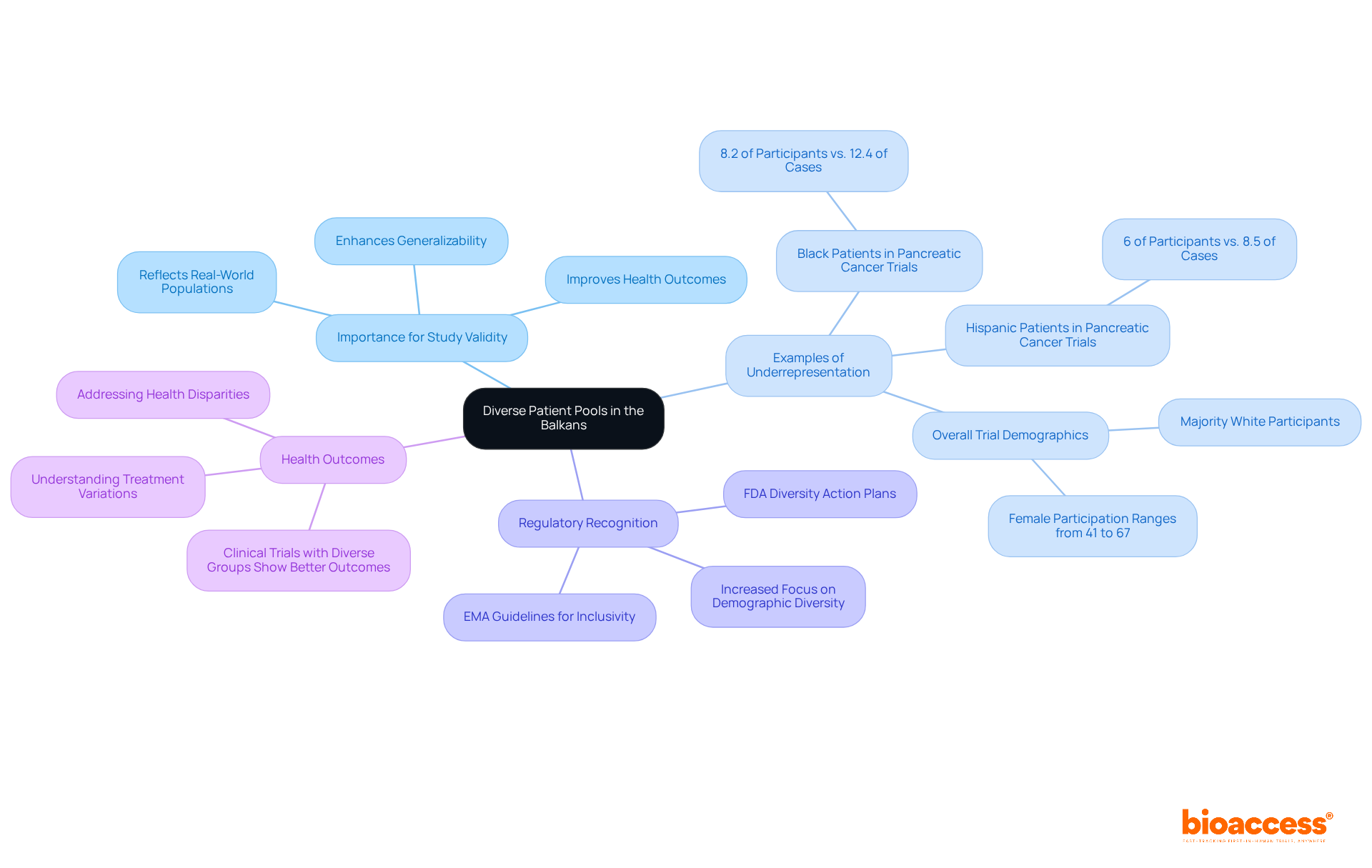
Australia is recognized for its highly effective ethical approval procedures, which significantly expedite the initiation of research studies. With an average approval period of just 4 to 6 weeks, bioaccess® adeptly navigates these streamlined processes, offering comprehensive research management services that include:
This capability not only accelerates product development timelines but also enhances the overall efficiency of research operations. For instance, Argenica Therapeutics has recently obtained ethics approval for its Phase 2 Clinical Trial of the neuroprotective drug ARG-007, set to commence patient recruitment in early 2024 across ten Australian hospitals.
Professor Bruno Meloni, Chief Scientific Officer, underscores the importance of such studies, stating, "Ischaemic stroke, where blood flow to the brain is disrupted, is a leading cause of disability and mortality but there are no neuroprotective treatments to reduce the brain damage occurring immediately after a medical emergency of this kind and in the critical following hours."
These instances exemplify the advantages of conducting medical studies in Australia, where regulatory efficiency and a commitment to patient safety converge to foster innovation in the Medtech sector, ultimately contributing to job creation, economic growth, and advancements in healthcare.
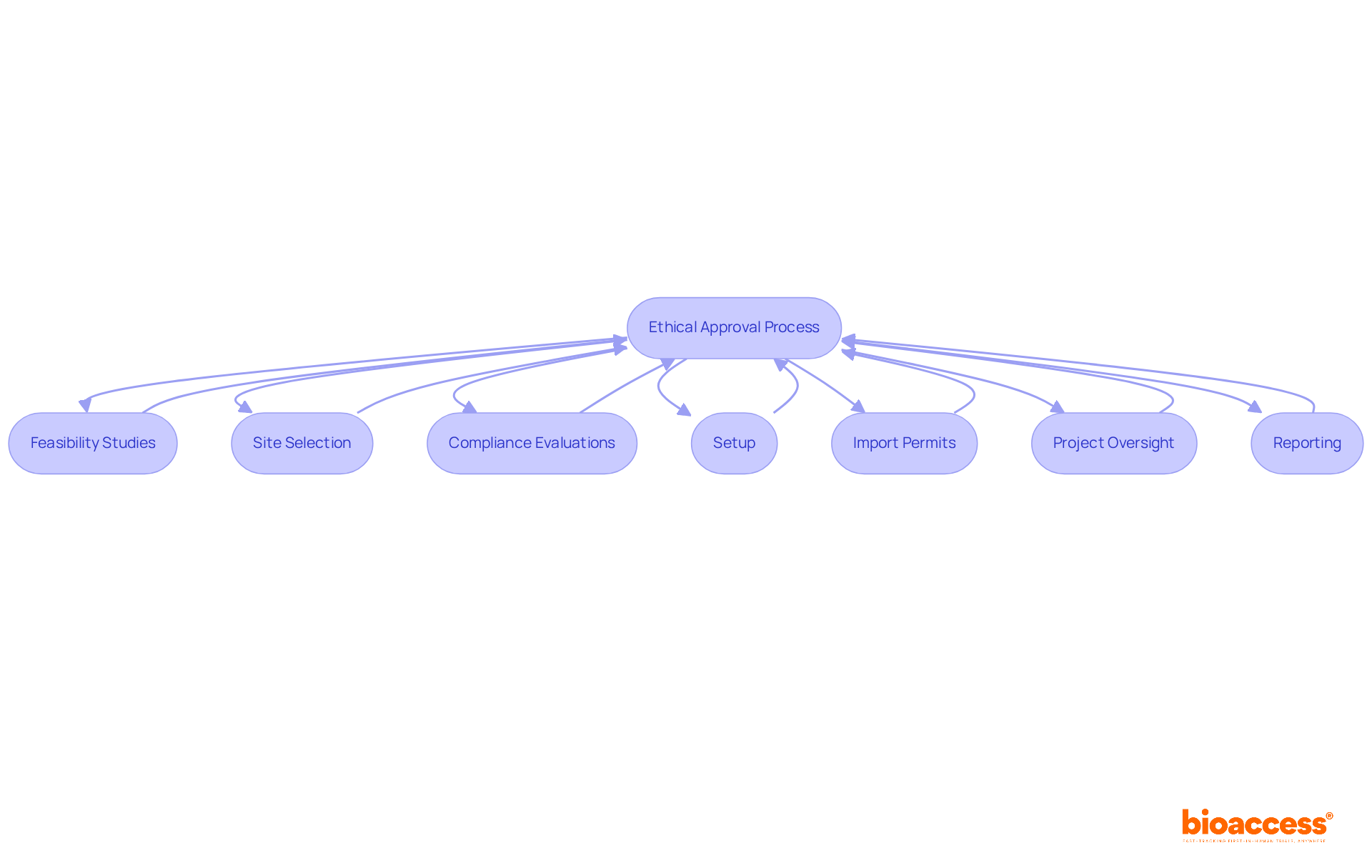
First-in-human (FIH) and early-feasibility studies are critical components of the clinical research landscape, serving as the initial testing grounds for innovative medical devices and therapies. These early-stage studies are vital for Medtech firms aiming to gather essential information on safety and effectiveness prior to larger tqt evaluations. This strategic approach not only mitigates risks but also fosters innovation, allowing developers to refine their products based on real-world feedback.
Notably, approximately 70% of medications in FIH evaluations successfully advance to subsequent phases, underscoring the importance of these studies in the development pipeline. For instance, Avantec Vascular's first-in-human study for an innovative vascular device in Latin America, supported by bioaccess, resulted in a 50% increase in patient enrollment for subsequent phases due to the robust safety data generated.
Such outcomes illustrate how early-feasibility studies can catalyze significant medical advancements, ultimately enhancing patient care and expediting the commercialization of groundbreaking therapies, particularly in the context of tqt. As the landscape of medical investigation evolves, the integration of advanced statistical techniques and adaptable trial designs further enhances the efficiency of these studies, paving the way for future progress in the Medtech sector.
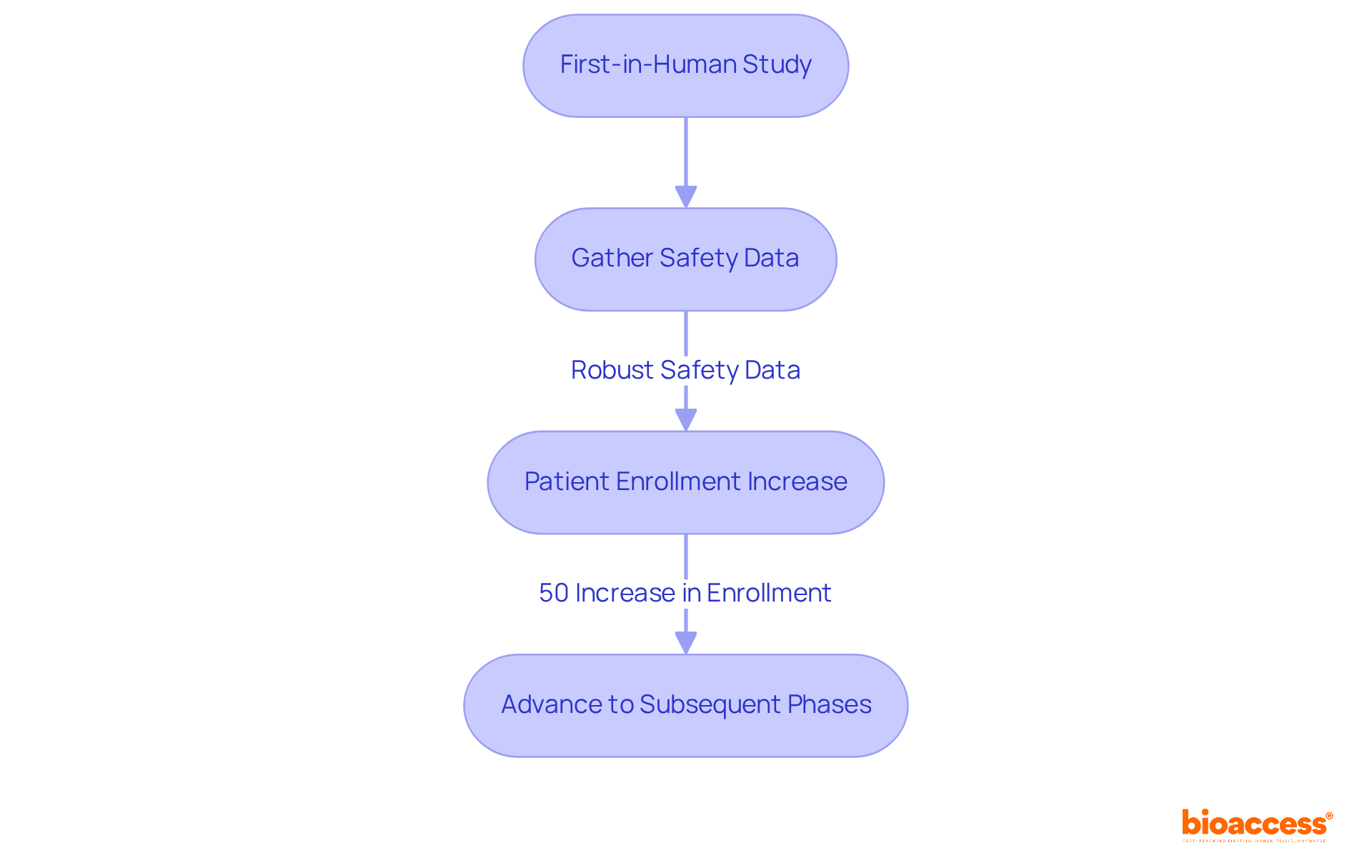
This company provides affordable research solutions that significantly support startups in the Medtech industry, which is essential for achieving tqt. By leveraging local insights and streamlining processes, their offerings enable companies to decrease operational costs without compromising on tqt. Their comprehensive research management services include:
This financial efficiency empowers startups to allocate resources more strategically, thereby enhancing their chances of success in a fiercely competitive market. With over 20 years of experience in Medtech, the company has enabled startups to achieve substantial reductions in trial costs, allowing them to focus on tqt and market entry. Such collaborations not only enhance operational efficiency but also position these companies favorably against larger competitors, ultimately fostering growth and sustainability in their healthcare initiatives.
Adherence to regulatory standards is crucial in clinical studies, and the company excels in maneuvering through this complex environment. By leveraging a deep understanding of both local and international guidelines, bioaccess® instills confidence in stakeholders while prioritizing participant welfare. This commitment to ethical practices safeguards the integrity of the research process and enhances the likelihood of successful outcomes.
For instance, the FDA's recent guidance on Diversity Action Plans underscores the importance of inclusive enrollment strategies, which can significantly improve participation from historically underrepresented populations. Furthermore, organizations that engage experienced regulatory counsel can mitigate compliance challenges, reducing the risk of poor-quality data and potential FDA enforcement actions.
As demonstrated by the situation of a worldwide pharmaceutical firm experiencing a nearly 20% decline in stock value due to unfulfilled study endpoints, regulatory adherence directly affects the success of medical research. By ensuring adherence to evolving regulations, this platform empowers Medtech, Biopharma, and Radiopharma innovators to accelerate their breakthroughs with confidence, leveraging tqt.
Moreover, through strategic partnerships, such as with Caribbean Health Group, bioaccess® positions Barranquilla as a premier location for research studies in Latin America, further improving the efficiency and effectiveness of research initiatives.
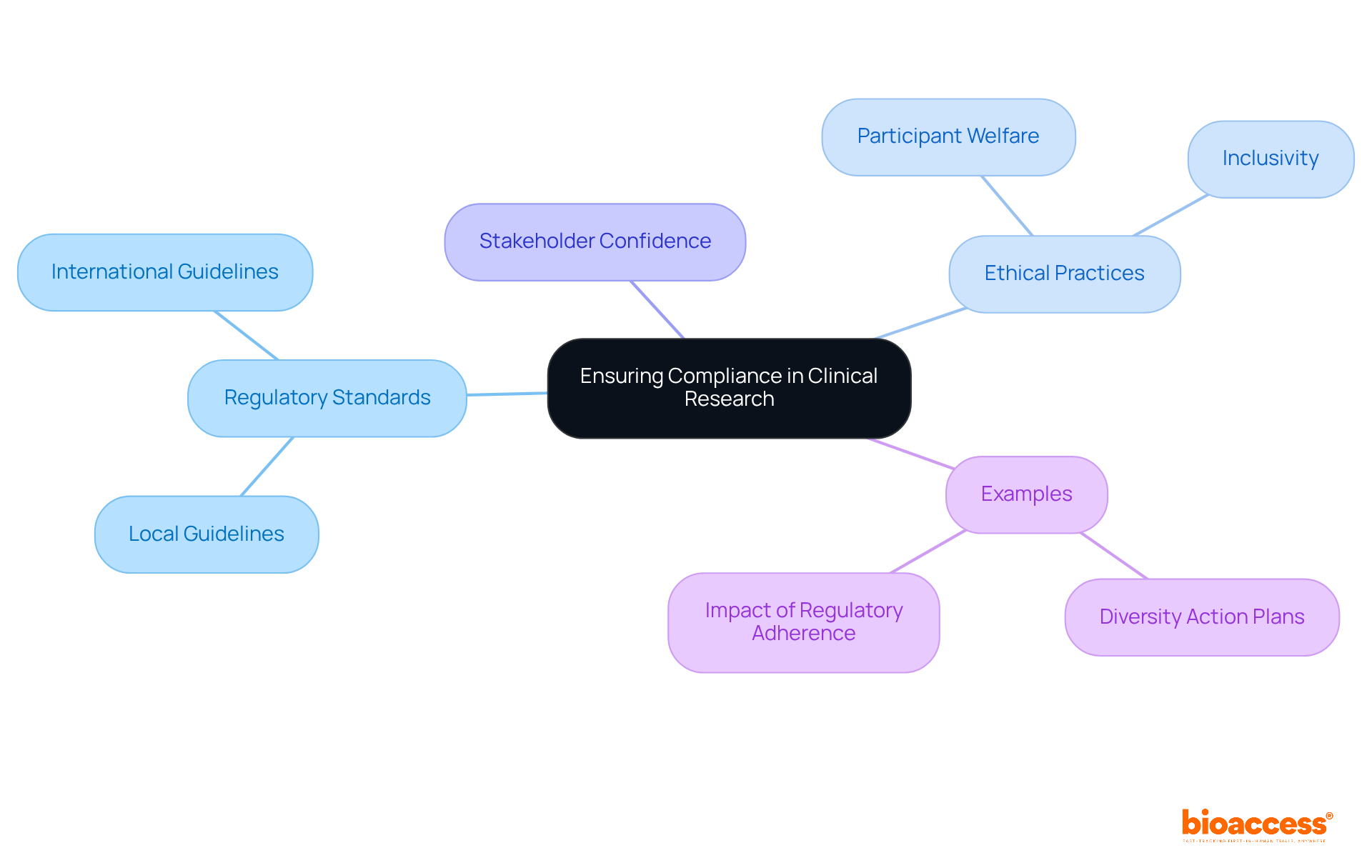
Hiring skilled researchers poses a significant challenge in medical studies, directly affecting the quality and efficiency of research. With approximately 37% of research trial locations under-enrolling volunteers and 11% failing to enroll any patients, the need for effective recruitment strategies becomes paramount. Additionally, the estimated cost of patient recruitment, referred to as tqt, accounts for 40% of the total budget, roughly $1.89 billion, underscoring the financial ramifications of these hurdles.
The organization employs targeted strategies to attract exceptional talent, ensuring that each project is staffed with skilled professionals capable of navigating the complexities of clinical studies. By fostering a collaborative environment and providing ongoing training, the organization enhances the capabilities of its study teams. This commitment to professional development not only improves team performance but also leads to more favorable outcomes.
For example, effective communication strategies, as illustrated in the RECOVERY Trial, demonstrate that clear information can significantly increase recruitment rates, as patients feel more informed and engaged. Moreover, with 80% of medical trials being delayed or terminated due to recruitment issues, the company continuously evaluates and refines its recruitment methods to ensure tqt meets the evolving demands of medical studies.
Drawing on over 20 years of experience in managing Early-Feasibility, First-In-Human, Pilot, Pivotal, and Post-Market Follow-Up Studies, the organization is well-equipped to address site participation and patient eligibility challenges, ultimately facilitating the advancement of medical innovations.

Effectively managing multiple research projects tqt is crucial for meeting timelines and maintaining quality standards in clinical research. The company employs comprehensive project management frameworks that emphasize tqt, clear communication, strategic resource allocation, and proactive risk management. During the planning phase, detailed project plans—including timelines, budgets, and resource allocation—are developed, which are essential for successful project execution tqt.
For instance, the partnership between the organization and Caribbean Health Group aims to establish Barranquilla as a premier location for clinical trials in Latin America, supported by Colombia's Minister of Health. This initiative exemplifies how tqt in structured project management significantly contributes to research outcomes. By implementing these strategies, the organization can efficiently juggle various tqt, ensuring that each study progresses smoothly and meets its objectives.
Furthermore, the five key phases of project management—Initiation, Planning, Execution, Monitoring, and Closure—are integral to this approach, enabling careful oversight and adjustments to challenges such as patient recruitment difficulties through tqt. Notably, GlobalCare Clinical Studies has collaborated with a partner to enhance ambulatory services for research in Colombia, achieving more than a 50% decrease in recruitment duration and 95% retention rates.
As Hend Abdelhakim observed, "A successful medical study necessitates organization and the efficient implementation of activities and tasks, within specified timelines and in a step-by-step manner." By balancing multiple trials with precision, this system not only enhances operational efficiency but also fosters an environment conducive to tqt and timely breakthroughs in Medtech.
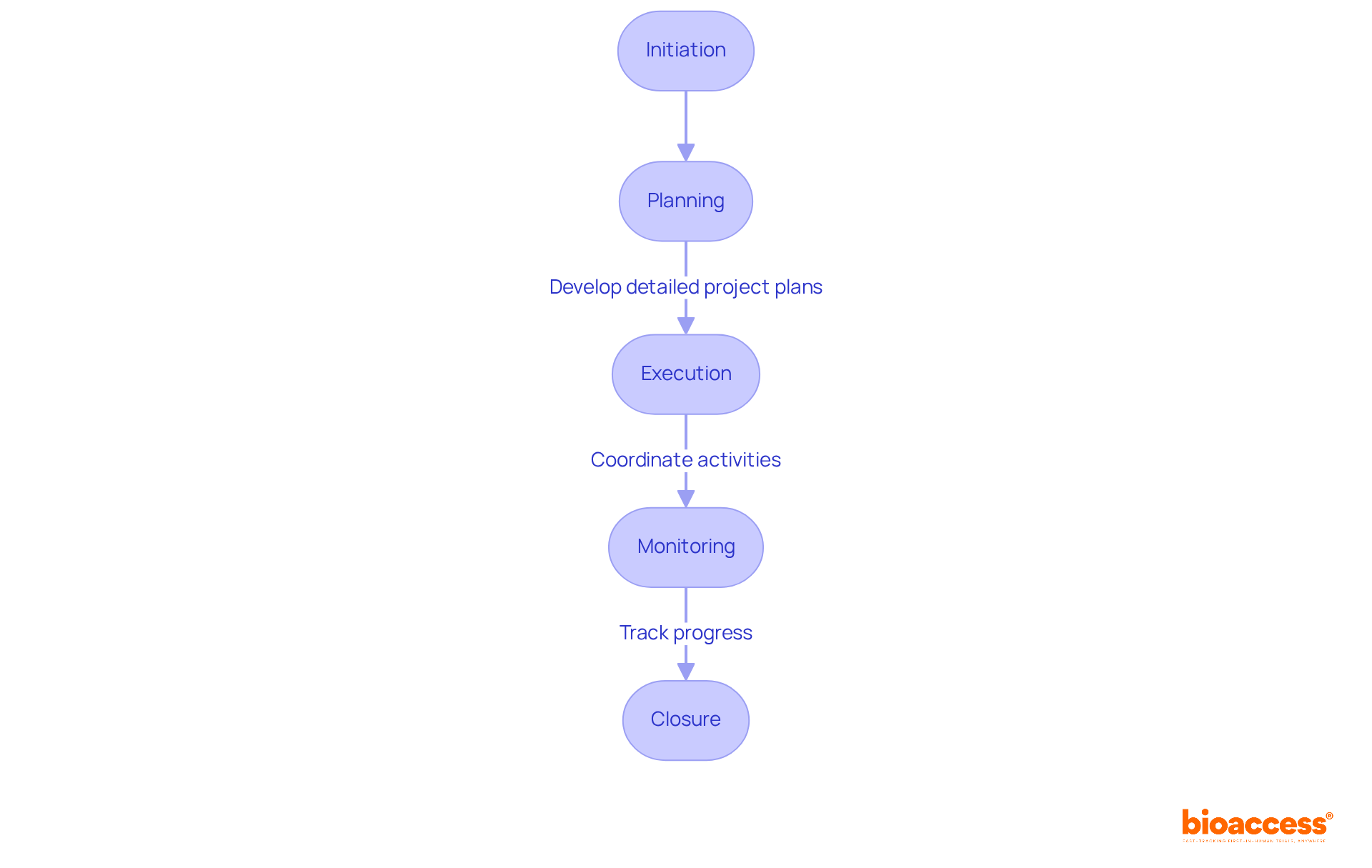
As a committed collaborator in promoting medical technologies, the company offers extensive assistance throughout the research process. With over 50 pre-qualified sites activated in less than eight weeks across LATAM, the Balkans, and Australia, the company ensures rapid site activation and FDA/EMA/MDR-compliant datasets with centralized monitoring. This dedication to efficiency has resulted in a decrease in clinical trial participant recruitment time by more than 50%, showcasing its effectiveness in accelerating market introduction. Significantly, the successful partnership with GlobalCare Clinical Trials attained an impressive 95% retention rate, highlighting its capacity to promote strong collaborations.
Moreover, with the regulatory and medical affairs segment within the CRO industry anticipated to expand at a CAGR of 12.4%, its established relationships with regulators are essential for navigating complex regulations, improving the overall effect of its services. Dushyanth Surakanti, Founder and CEO of Sparta Biomedical, attests to bioaccess®'s pivotal role during its first human trial in Colombia, further illustrating the company's dedication to accelerating clinical trials for Medtech and biopharma startups.
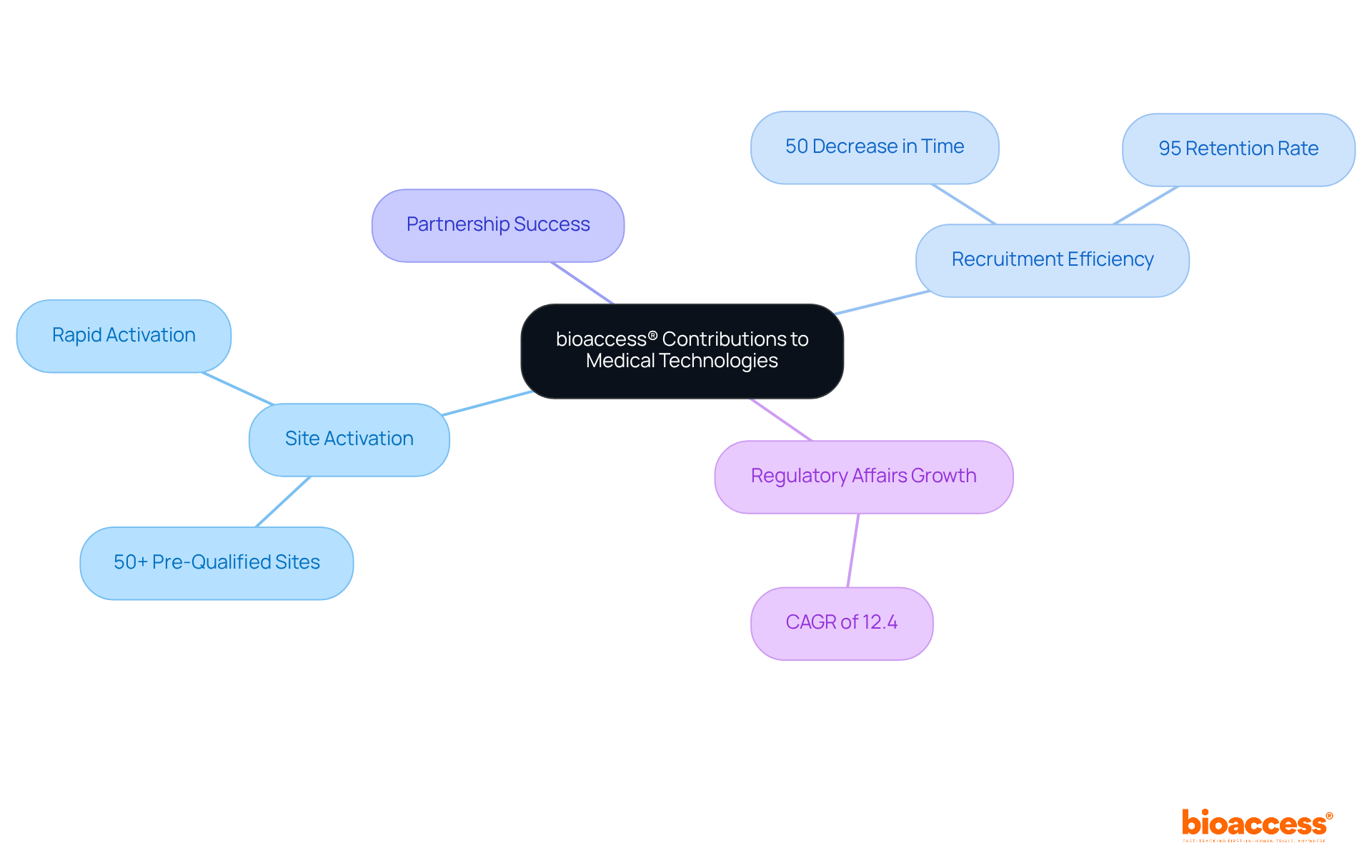
The innovative approach of bioaccess® fundamentally transforms the landscape of clinical research for Medtech companies by streamlining processes and expediting timelines. By leveraging a unique global-first strategy, this organization facilitates faster regulatory approvals, diverse patient recruitment, and ethical compliance, ultimately ensuring that groundbreaking medical technologies reach the market more swiftly and efficiently.
Throughout the article, key insights highlight how bioaccess® not only enhances the speed of clinical trials but also elevates the quality and inclusiveness of medical research. From the rapid ethical approvals in Latin America and Australia to the emphasis on diverse patient demographics in the Balkans, each aspect plays a crucial role in improving study validity and fostering innovation. Moreover, the cost-effective solutions provided by bioaccess® empower startups to navigate the complexities of clinical research without compromising on quality, thereby maximizing their potential for success.
The significance of these advancements cannot be overstated. As the Medtech industry continues to evolve, the ability to conduct efficient and inclusive clinical trials is paramount for developing therapies that truly reflect the needs of diverse populations. Engaging with platforms like bioaccess® not only accelerates the path to market for new medical innovations but also contributes to a more equitable healthcare landscape. Embracing such partnerships will be essential for organizations aiming to thrive in the competitive world of medical technology and improve patient outcomes globally.
What is bioaccess® and how does it benefit clinical research?
bioaccess® is a company that accelerates clinical research by employing a global-first strategy that combines rapid regulatory processes, diverse patient demographics, and efficient ethical approvals. This approach allows Medtech creators to expedite their clinical studies, significantly shortening the time for innovative technologies to reach the market.
How quickly can ethical approvals be obtained through bioaccess®?
Companies using bioaccess®'s services can expect to receive ethical approvals within 4 to 6 weeks.
How does patient enrollment speed compare to traditional markets?
Patient enrollment through bioaccess® is typically 50% faster than in traditional markets.
What financial incentives are available for conducting research in Colombia?
Colombia offers R&D tax incentives, including a 100% tax deduction and various financial advantages, making it an attractive location for conducting experiments.
What standards do hospitals in Colombia adhere to for medical studies?
Hospitals in Colombia must complete a stringent ICH/GCP certification procedure, which ensures high-quality standards in medical studies.
What advantages does Latin America provide for clinical trials?
Latin America has a unique regulatory environment that accelerates the approval process for research studies, with ethical approvals typically secured within 4 to 6 weeks. This efficiency helps Medtech companies initiate studies without the delays common in other regions and reduces costs associated with bringing new medical technologies to market.
What types of services does bioaccess® offer to navigate the regulatory landscape?
bioaccess® provides comprehensive services, including Early-Feasibility Studies, First-In-Human Studies, and Pilot Studies, to assist companies in managing the complexities of the regulatory environment.
Why is patient diversity important in clinical studies conducted in the Balkans?
The Balkans offer diverse patient demographics, which enhances the reliability and generalizability of medical studies. Recruiting from varied populations helps uncover variations in treatment responses and contributes to a better understanding of health outcomes across different ethnic groups.
What is the significance of demographic diversity in clinical trials?
Demographic diversity is crucial for ensuring that study results accurately reflect the global market. Regulatory bodies like the FDA are increasingly recognizing this importance and are mandating Diversity Action Plans to ensure trials represent the communities they aim to serve.
How does prioritizing patient diversity contribute to healthcare outcomes?
By prioritizing patient diversity, bioaccess® enhances the validity of medical research and contributes to more equitable healthcare outcomes, aligning with the goal of ensuring that studies reflect the complexities of real-world populations.